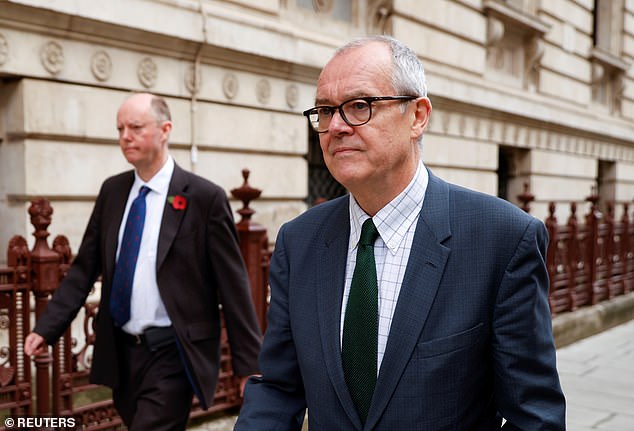People might still have to wear face masks next winter, Sir Patrick Vallance said today.
The chief scientific adviser said the precaution – new to the UK but standard practice in some Asian countries – could be a long-term fix if coronavirus keeps circulating.
Britain today became the first country in the world to start vaccinating citizens against Covid-19, but scientists still don’t know whether the jab can stop people spreading the virus.
Trials proved that it can prevent the Covid-19 illness, at least temporarily, but only time will tell whether it stops people picking up the virus and giving it to others.
Sir Patrick said it would ‘take quite a long time’ to get the vaccine to everybody in the UK and other top scientists say the virus could become seasonal like the flu.
Social distancing will have to continue until the vaccine can be given to everyone at a high risk of dying, officials say, although most people expect a semblance of normality to return by Easter.
Sir Patrick Vallance (pictured right, walking beside Professor Chris Whitty) was a voice of caution on the day when the UK became the first nation in the world to start vaccinating citizens against Covid-19
Speaking to Sky News today, Sir Patrick said: It’s going to take quite a long time to make sure everybody in the at-risk groups and all of the groups that are difficult to reach get vaccinated as appropriate…
‘It may be that next winter even with vaccination we need measures like masks in place – we don’t know yet how good all the vaccines are going to be at preventing the transmission of the virus.’
The way coronavirus vaccines have been trialled is designed to test whether they prevent Covid-19, the illness that the virus causes.
Trials can evaluate this by watching how many people get sick in the vaccine group and comparing it to a group given a fake vaccine.
They cannot, however, confirm whether people can pick up the virus without developing any symptoms and then pass it on to someone else.
For this reason, even though vaccinations are under way now, social distancing and lockdown rules must stay in place for many more months to come.
It takes at least a month for full immunity from a vaccine to kick in, too, with the Pfizer jab given in two doses spaced three weeks apart.
Sir Patrick said that it was unlikely that the UK would get back to normal before the spring.
‘It is important we all stick to the rules in the meantime,’ he added. ‘The rules are what’s keeping the virus down.’
The UK was slow to adopt face coverings because scientific evidence was not clear on whether they would stop the transmission of the virus.
But after research suggested they could prevent people without symptoms unknowingly infecting others – even if they didn’t protect the wearer – officials decided to err on the side of caution.
The virus is spread through tiny airborne aerosol particles from coughing, sneezing, breathing or even talking, and these particles can also gather on surfaces and be transmitted through touch.
While medical-grade masks filter out 95 per cent of large airborne particles, there is a growing body of evidence showing that even a simple cloth barrier helps dramatically slow transmission rates.
A Chinese study published in late May found that mask-wearing even helps prevent infection within households.
The study of families in Beijing found the practice was 79 per cent effective at stopping transmission before symptoms emerged in the first person infected.
Last week there was an awkward moment when deputy chief medical officer for England Professor Jonathan Van-Tam said he expected coronavirus would never disappear, to the apparent annoyance of Boris Johnson.
He said at a Downing Street press briefing: ‘I think it’s going to be with humankind forever.
‘I think we may get to a point where coronavirus becomes a seasonal problem.
‘I don’t want to draw too many parallels with flu but, possibly, that is the kind of way we would learn to live with it.’
He added: ‘Do I think there will come a moment when we can have a big party and throw our masks and hand sanitiser and say ‘that’s it, it’s behind us’ like the end of the war? No I don’t.’
Professor Van-Tam said that the measures we have adopted to protect ourselves ‘may persist for many years and that may be a good thing’.
The Prime Minister interjected: ‘That may be a good thing but on the other hand we may want to get back to life pretty much as close to normal.’
Prof Van-Tam later clarified: ‘I do not think the Government will continue to have to recommend social distancing, masks and hand sanitiser forever and a day.
‘I hope we will get back to a much more normal world.’
